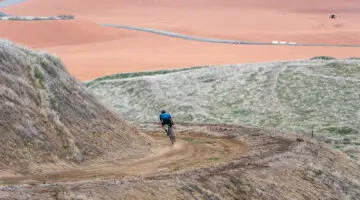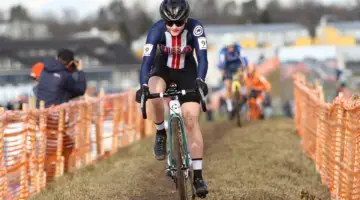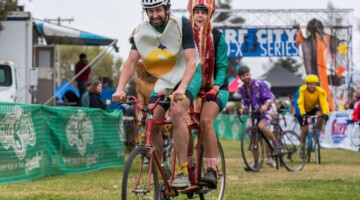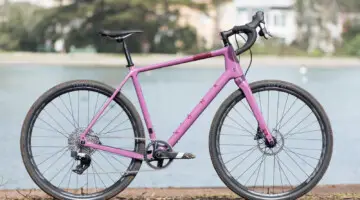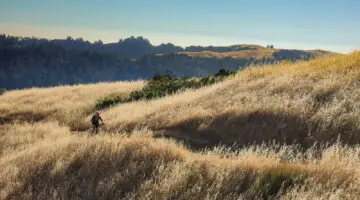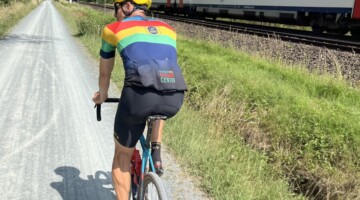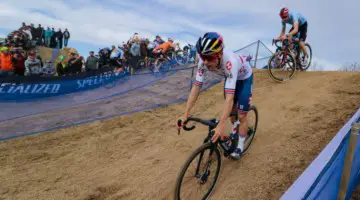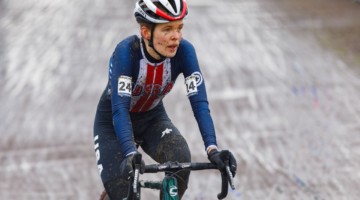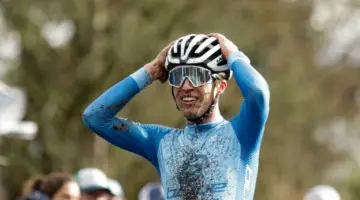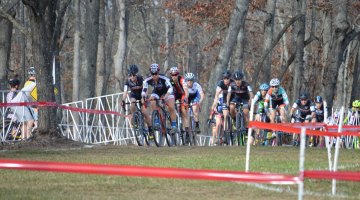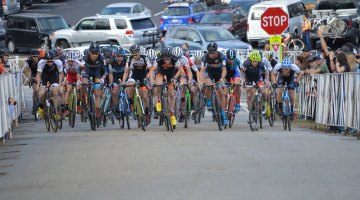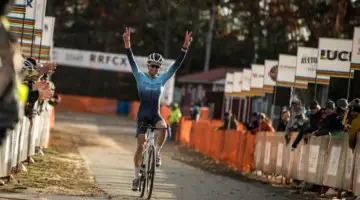Gage Hecht has established himself as one of the bright stars of U.S. cyclocross. The 19-year old rider has won six Cyclocross Junior national championships and finished second behind Lance Haidet in the epic U23 race in Hartford earlier this year. When not racing cyclocross, Hecht has opted for the road, where he has also amassed a nice collection of Stars-and-Stripes jerseys, for his offseason training.
Over the Fourth of July weekend, Hecht faced down the tall task of the U23 Men’s Road Race Nationals in Louisville. The race featured a short circuit-style course through a park and Hecht was able to use his ’cross-trained bursts of speed to get into the ultimate selection and take a second-place finish to go with his second from Cyclocross Nationals in January.
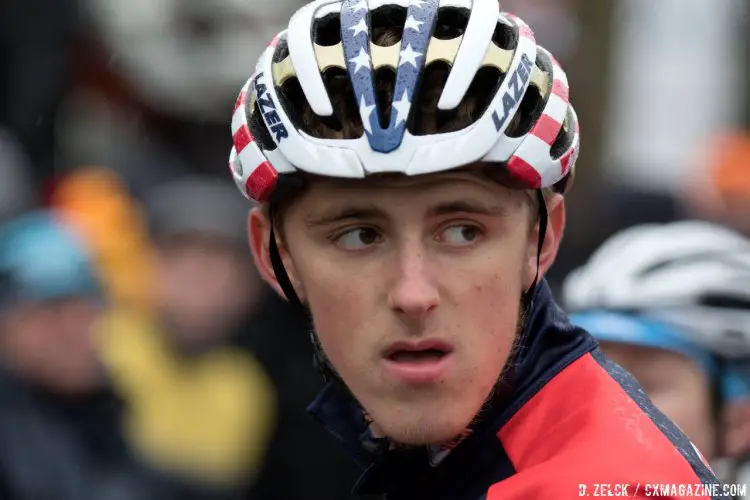
Gage Hecht, seen here at Tabor in 2015, celebrated the red, white and blue with an impressive Fourth of July weekend in Louisville. © Danny Zelck / Cyclocross Magazine
I got the opportunity to catch up with Gage while he was catching his breath at home in Colorado before heading on the road again for the Boise Twilight Criterium, Cascade Stage Race and Geoff Proctor’s Montana Cyclocross Camp, where he is currently getting some cyclocross training in.
Please read on for excerpts from our conversation that covered the benefits of road racing for cyclocross, learning tactics on the road and why he loves criteriums. You can also find the full audio of our conversation that has even more great insight from the young multi-discipline star.
Cyclocross Magazine Interview with Gage Hecht
Cyclocross Magazine: With the cyclocross offseason it seems like you either do road or you do mountain. I was looking at it seems like you’ve kind of chosen road as your jam. What do you like about road as your offseason for cyclocross?
Gage Hecht: It’s great just because you keep a lot of the skills you use for cyclocross. You keep those really polished and ready to go. And you also get a lot of good base miles in and racing experience before the season even starts, so you’re always, maybe not fitness-wise, one step ahead of everybody who hasn’t been racing road, but you’re maybe mentally more prepared and you have a little bit more backing you going into that.
CXM: That makes sense. What mental aspect of racing are you talking specifically about or do you find that helps?
Gage Hecht: There’s a bunch of different things that it helps with. The pack thing, for getting the start, just putting yourself in situations where you know it’s going to be a tight sprint or something like that. It really gets you prepared for trying to get up to the front for the hole shot if you’re not front row or getting ready to fight for corners and that sort of thing.
Another thing it helps you with is that will to keep pushing through pain. I feel like if I don’t exercise that ability it kind of wears off, and you kind of have to redevelop it. Just that will to push through pain is developed through road racing. For me, anyways.
“That will to push through pain is developed through road racing.”
CXM: You’ve obviously had a little bit of success as a cyclocross rider, but you spend a lot of time on the road. What do you do to get your bike handling skills up?
GH: Going into ’cross season, I am typically a little rusty on that, but there are a few things I have done in the past. Helena, at Geoff Proctor’s camp [Montana ‘Cross Camp] has been amazing for that. I’m actually about to go to that after Cascade. He puts on a camp up there and gives all the ’cross riders who have some potential the opportunity to go over to Europe and race for Team USA. He gives them the opportunity to polish up their skills, get some good riding in the dirt in and get ready for that. That seems to help a lot, just being up there in the mountains doing pretty much mountain bike trails on ’cross bikes. It really sets you up for ’cross pretty well.
The other thing I’ve found is even when I am not at Geoff’s camp, if I put in a few mountain bike-type rides on the ’cross bike, maybe on not quite that difficult of a trail, like full-on rock gardens. If I go out there and mess around on the ‘cross bike a little bit up in the mountains that seems to help a lot as well.
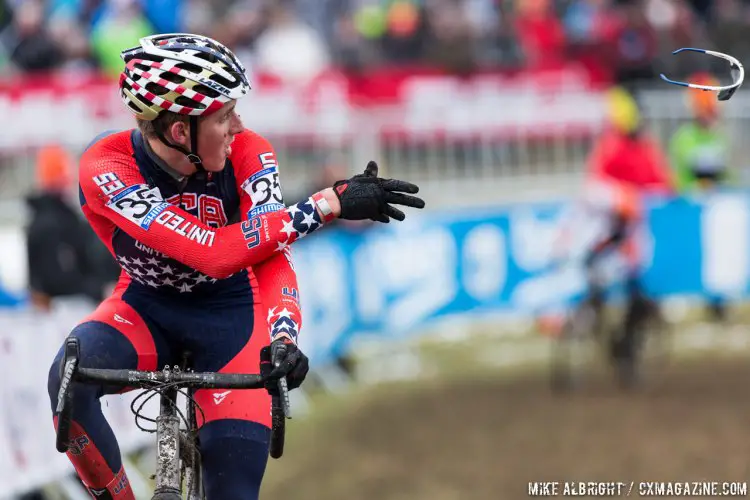
You will have to ask Gage if his offseason training includes perfecting the sunglasses toss. © Mike Albright / Cyclocross Magazine
CXM: I feel like singletrack is going to be a little bit tougher, generally speaking, than what you encounter on a cyclocross course. Although you’ve done some racing in Europe, so that might not be totally true. I will say I used to ride my ’cross bike on singletrack, you should try a mountain bike.
GH: I would love to, but I don’t have a mountain bike right now. That’s kind of hindering me there.
CXM: Someone out there needs to get Gage a mountain bike. I think he’s earned it and he’ll have way more fun. It is definitely more fun.
GH: Definitely. The few times I have been able to get out on suspension in the past few years it’s always a huge surprise for me. It’s like wow, I can actually take this somewhat quickly instead of having to kind of balance the bike as you’re going over rocks and make sure you’re not going to pinch tires as you’re doing it.
CXM: The reason I wanted to talk to you, you were the man last weekend in Louisville. I felt like we had like 17 posts about our poster boy. Second-place finish at U23 road, you gotta be pretty excited about that, huh?
GH: Oh, I was ecstatic about that. I went into Nationals not really knowing what to expect. I had never raced a U23-specific race because they don’t really have a lot of those in the U.S. That’s really the only U23-specific race I’ve done. You can go over to Europe and race those, but I just haven’t found a good time for that to happen this year and the opportunity hasn’t presented itself. I really didn’t know what to think going into Nationals this year. My team,
My team, Aevolo, helped me get into some opportunities, and we kind of made our own luck a little bit in some parts. Eventually I made it up the road to where my teammate Michael Hernandez was and worked with his group for a little bit. I stayed with Neilson [Powless] all the way to finish. That was better than what I was expecting by far, so I was excited about that.
CXM: It looked like an interesting layout. It was like, what, seven or eight kilometers in a circuit. What was it like racing that? Was it faster than a normal road race?
GH: That course was a bit weird because you don’t do races, in the U.S. anyways, or really even that much in Europe, that are that technical and where you do that many laps on it. Typically the longest straightaway section on that course was maybe 500 meters and then you were going into another turn after that. The window of being able to see who’s up the road is pretty small, and the fact that you’re doing 24 laps on that course adds a little twist to it because you see the exact same course 24 times. You really get to study corners and think about how you want to take corners throughout the race. Where’s a good place to try and make a move and where it’s better to try and recover.
Which is kind of a cool thing coming from a ’cross racing perspective because that’s pretty much what we’re ingrained to do as a cyclocross rider: make observations about courses throughout the race and see where we can maybe put an attack in and what we can do with what we have. Just the punchiness that came with that course being so twisty and turny definitely paid off a little bit for me. Never having to have to put an interval in that was longer than maybe five minutes, just because there were no real long efforts in that course.
CXM: Generally speaking, in ‘’cross you ride as hard as you can. Maybe there are a few features you need to figure out. How do you learn about road tactics? Do you study up, or does it just come from experience?
A: My entire life I’ve been doing road in conjunction with ’cross, so that’s a lot of experience through teams [I’ve raced for]. My dad was head coach of one of them and he had done quite a bit of racing back in his 20s and 30s, and so he definitely mentored me in the basic skills of that, and there were a bunch of other coaches who helped out.
Then I moved up to Team Specialized Racing and they helped me fine tune some of those pack-riding abilities and how to work with a team. Just some of the basics. How to work as a team in the 15s and 16s. Then as I moved up into the 17 and 18s, Hot Tubes took over in that development. Hot Tubes was definitely one of the biggest factors in my ability to work with other people, and really how to be a good road racer. You learn a lot of things doing big stage races with that team that I think are really hard to get if you just watch video on video of how to do the things we do. It’s really hard to learn the things Hot Tubes teaches you without actually doing the races that they do and being able to put it into practice. I think this year
I think this year Aevolo has done a great job of helping me be a better racer. At the beginning of the year I hadn’t done a century before. I did Gila [stage race], and that was my first actual century ride, which is kind of funny. Mike [Hernandez], and all my teammates have helped me out in terms of how I race and get through that one hundred miles more effectively. Be a better help to them and be able to be sure our GC guy gets to the finish line with what he needs. How I can find opportunities for myself to maybe get off the front and be competitive in the break that’s up there.
The long string of teams I’ve had on the road side has helped me fine tune and develop bits of the knowledge I have had coming into this. I wouldn’t say I’m an expert by any means. I’m doing a lot of guesswork still. We’ll see what I can do the rest of my career.
CXM: That’s awesome that you’ve gotten those experiences to develop like that because like you said if you were just out there racing without learning the tactics of it, seems like it won’t do you any good. So with all the strategy and thinking and stuff, do you look forward to ‘cross at all? It seems like it’s a little simpler in a way. You kind of go out and ride your bike.
GH: ’Cross is always a nice mental break because it’s just like go hard for an hour and do all you can while you’re out there, and then you’re done. That’s always kind of a nice thing. I mean it takes some thinking because you’re still having to ride with other people, and I feel like the higher level you get to in ’cross, the more it turns into more a road race-type environment. It’s still like racing with 170 guys for five days on end, four hours a day. It’s definitely a nice mental break from that. Physical break as well. I always look forward to getting back into the dirt and getting muddy again, and all the fun stuff that comes with ’cross. I’m really excited for it to come this year.
“I always look forward to getting back into the dirt and getting muddy again, and all the fun stuff that comes with ’cross. I’m really excited for it to come this year.”
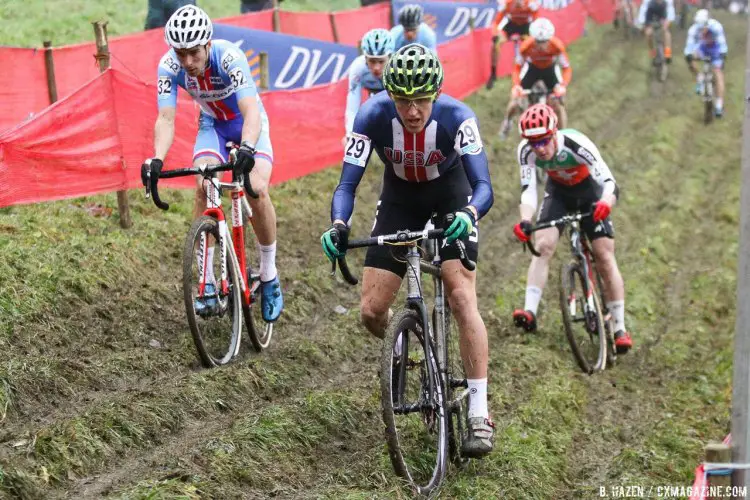
Gage Hecht is ready to get back into the mud and dirt. 2016 Namur Cyclocross World Cup, U23 Men. © B. Hazen / Cyclocross Magazine
CXM: You also did the Pro criterium on Sunday. Do crits help you prepare for cyclocross season at all?
GH: They’re amazing training for cyclocross, just because they’re similar effort types. You’re constantly on and off the gas, getting ready for corners, setting yourself up for corners. And typically in crits, this year anyway, I’ve been able to get into a lot of breaks, which gets to be more similar to a cyclocross race because you’re racing with a group of like three to eight riders. That’s a lot of times what you end up seeing in a ’cross race, something like that. It’s not quite as technical as a ’cross race in terms of being able to handle your bike, but the effort level, being able to follow attacks of eight guys and figuring out which of the eight guys you need to follow and which ones you don’t. I really feel like that’s one of the things that has made me love crits so much, the similarity to ’cross racing.
CXM: What was it like making the jump from being a Junior to being able to race UCI races in cyclocross last year, especially at the beginning of the year?
GH: The thing is on Alpha-Vista Subaru last year we already had Brannan Fix had already made the step up into the U23, so he was excited for me to come up and race with him. He definitely helped me learn the ropes a little bit and get to know what to expect from the U23 field. I think he definitely helped with the transition. Of course, Alpha-Vista Subaru getting me to races was another big thing. By myself, I wouldn’t have been able to have traveled to as many races as I did last year, so they were a big factor just in getting me to races and giving me the ability to really have a trial-and-error experience in the U23s.
The first two races I was a little, what’s the word I’m looking for, I was definitely really nervous about them because the guys I would be racing were the guys I have been looking up to and the guys in the category ahead of me for the past eight years of Junior riding. It was kind of hard to imagine racing against these guys. Curtis White is one of the names who comes to mind. Seeing him be so successful with all of his racing and then having to race against him. Luckily I like all of the guys I got to race against. It was just a really cool experience to step up to that next level in the U23s.
Audio: Interview with Gage Hecht
Need something to listen to on the commute to work or that long ride? Check out all our interviews in the audio file.

